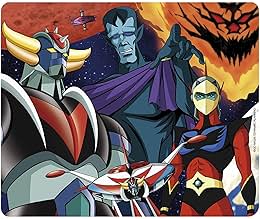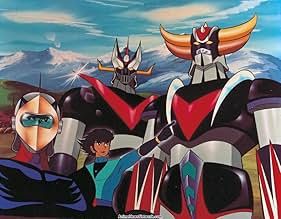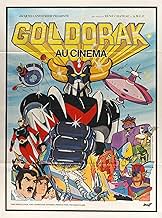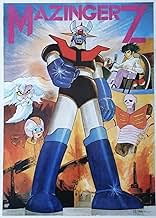IMDb RATING
8.4/10
2.7K
YOUR RATING
The young Prince of planet Fleed flees his destroyed homeland aboard the UFO Robot Grendizer. On Earth, aided by a scientist and allies, he battles Vega's forces sent to capture Grendizer an... Read allThe young Prince of planet Fleed flees his destroyed homeland aboard the UFO Robot Grendizer. On Earth, aided by a scientist and allies, he battles Vega's forces sent to capture Grendizer and conquer or destroy the universe.The young Prince of planet Fleed flees his destroyed homeland aboard the UFO Robot Grendizer. On Earth, aided by a scientist and allies, he battles Vega's forces sent to capture Grendizer and conquer or destroy the universe.
Browse episodes
Featured reviews
OK, the animation may be stiff and the characters cardboard, but this show carries great memories for thousands of people around the world. Mildly successful in Japan, "Grendizer" aka "Goldorak" or "Goldrake" was one of the first Japanese cartoons to achieve such great success and retain a cult following for such a long time. Even today, the struggle of the hero Actarus (aka Duke Fleed) against the evil hordes of "Great Strateguerre" Vega give me shivers down my spine! BTW, among the corny aspects of the show, which add to its appeal : why the heck does Vega keep sending his giant robots ONE BY ONE (gettings their asses kicked by Grendizer episode after episode) instead of sending them all in one big assault? Beats me. Talk about a lousy galactic overlord! Seeing a Grendizer episode is like a fountain of youth to me ! I just can't get enough of its cheesy charm!
The 3rd of Go Nagai's mecha, Grendizer carries over much of what made Mazinger Z and Great Mazinger successful, but manages to freshen things up. Even though Kabuto Koji is present, it feels a lot more like a standalone series.
The art and the animation are much cleaner than the previous entries in the catalog, often closer to the more polished OVAs. The sound design is also vastly superior.
The silly and often annoying comic relief element is not as omnipresent as it was in Great Mazinger, where Boss is often the focus of attention for much of the episode. In fact, thankfully enough, Boss is only featured in a handful of episodes. Grendizer's own cast of silly characters such as Danbei and Banta is somewhat easier to ignore for the most part. And thankfully, there are no such absurdities as taking crows either.
Even if it's made for kids, the tone is more serious, with romantic and even tragic elements, and the characters have a lot more depth.
And this is reinforced by the extraordinary music of Shunsuke Kikuchi, one of the great Japanese composers of the late 20th century. The score is full of pathos and remarkably dynamic, often reminiscent of Ennio Morricone. The music alone gives much more depth to the series than what you find in Mazinger Z and Great Mazinger.
Of course, the series has its share of fillers but overall it is very enjoyable.
I would recommend watching it in Japanese if you do have that option, as the progression of the series makes more sense. The translated versions can sometimes feel as though they were done in batches of a few episodes, without any real notion of the overarching plot. That being said, I grew up watching it in French, and I can attest that they did a fantastic job with that version, despite some issues. I assume that the same goes for the Arabic and Italian versions, seeing how beloved this series remains in France, Quebec, Italy and some Arab countries almost 50 years later.
The art and the animation are much cleaner than the previous entries in the catalog, often closer to the more polished OVAs. The sound design is also vastly superior.
The silly and often annoying comic relief element is not as omnipresent as it was in Great Mazinger, where Boss is often the focus of attention for much of the episode. In fact, thankfully enough, Boss is only featured in a handful of episodes. Grendizer's own cast of silly characters such as Danbei and Banta is somewhat easier to ignore for the most part. And thankfully, there are no such absurdities as taking crows either.
Even if it's made for kids, the tone is more serious, with romantic and even tragic elements, and the characters have a lot more depth.
And this is reinforced by the extraordinary music of Shunsuke Kikuchi, one of the great Japanese composers of the late 20th century. The score is full of pathos and remarkably dynamic, often reminiscent of Ennio Morricone. The music alone gives much more depth to the series than what you find in Mazinger Z and Great Mazinger.
Of course, the series has its share of fillers but overall it is very enjoyable.
I would recommend watching it in Japanese if you do have that option, as the progression of the series makes more sense. The translated versions can sometimes feel as though they were done in batches of a few episodes, without any real notion of the overarching plot. That being said, I grew up watching it in French, and I can attest that they did a fantastic job with that version, despite some issues. I assume that the same goes for the Arabic and Italian versions, seeing how beloved this series remains in France, Quebec, Italy and some Arab countries almost 50 years later.
Cult series across France, Belgium, Italy, Quebec, as well as some part of the Arabic world, like Tunisia. The show was a huge hit for children growing in the late 70s or early 80s. Adults may find it somewhat repetitive, unless they have an interest for anime and mangas. It has been designed with a target audience of 5 and 6 y.o. boys in mind.
Crappy English tranlastions can account for part of its lack of success in the English-speak world. One UK translation is supposed to be correct, more respectful of the original.
A web search should reveal more than a few fan sites. The series ran on French tv (FR2, FR3 and TVA) from 1978 to 1989.
A lot more imaginative than what most shows offer today--although its not a family show, just a children show. ;-)))
Crappy English tranlastions can account for part of its lack of success in the English-speak world. One UK translation is supposed to be correct, more respectful of the original.
A web search should reveal more than a few fan sites. The series ran on French tv (FR2, FR3 and TVA) from 1978 to 1989.
A lot more imaginative than what most shows offer today--although its not a family show, just a children show. ;-)))
This bland robot show (which aired as 'Goldorak' as I remember it) lacked the amorality, female nudity and blood splattering violence of 'Albator, le corsair de l'espace'(another children's cartoon on French tv in Canada at the time) -- thus it was less interesting to young boys in my grade.
Interestingly, the Quebec courts passed a law in 1999 forbidding parents from naming their child 'Goldorak.' I'm not making this up.
Interestingly, the Quebec courts passed a law in 1999 forbidding parents from naming their child 'Goldorak.' I'm not making this up.
Being in North America, I only got 26 episodes of the whole series as a kid. The only reason I remember it is because of the "movie" we rented so often, where Jim Terry Productions had taken scenes from several eps and cut them together, with some fresh voiceovers.
I just got hold of the entire series in Japanese with English subs this year. I had NO idea it had so many underlying themes, like belonging, protecting the environment, learning to rely on others, PTSD, and more. And Hikaru/Brenda's story arc was awesome.
My only gripes are the 70s-style comic relief. Danbi/Panhandle is annoying as hell, whether in English or Japanese. Boss is annoying, and Banta/Carlos usually is, too. It is also very plot-driven, e.g., Koji/Lance lights sticks of dynamite to free Hikaru from a seaweed trap...underwater. And sometimes Duke Fleed/Orion Quest uses the spazer to tag-team against a foe, and sometimes he doesn't. That sort of thing.
But was also the predominant way of writing cartoons back then. That they tackled such heavy themes as the after-effects of war on a person really surprised me.
Oh! One other thing that was so beautiful: almost every episode ends with a view of the sun, either direct or as a background. It was a lovely touch to show that this show is Japanese.
The American version that I watched as a kid erased almost all signs of the show's actual location. Given the American-style ranch, it was easy to do. And although I haven't watched the full French series yet, I've noticed the erasure, too, where possible. Heck, even the subtitles of the Japanese original that I have sometimes erase "Japan" or "Japanese" for English speakers.
But to demonstrate with actual dialogue from the scene in ep 1 where Koji lands his TFO at the ranch:
1. Japanese original: Koji confirms he's Japanese (he says, "Nihonjin"), not an alien.
2. American dub: "I'm more human than you are!" 3. French dub: "I'm a friend."
So, all in all, a beautiful series that's tons of fun, and you can hear the voice actors having fun while they're at it.
"Grendizer, go!"
I just got hold of the entire series in Japanese with English subs this year. I had NO idea it had so many underlying themes, like belonging, protecting the environment, learning to rely on others, PTSD, and more. And Hikaru/Brenda's story arc was awesome.
My only gripes are the 70s-style comic relief. Danbi/Panhandle is annoying as hell, whether in English or Japanese. Boss is annoying, and Banta/Carlos usually is, too. It is also very plot-driven, e.g., Koji/Lance lights sticks of dynamite to free Hikaru from a seaweed trap...underwater. And sometimes Duke Fleed/Orion Quest uses the spazer to tag-team against a foe, and sometimes he doesn't. That sort of thing.
But was also the predominant way of writing cartoons back then. That they tackled such heavy themes as the after-effects of war on a person really surprised me.
Oh! One other thing that was so beautiful: almost every episode ends with a view of the sun, either direct or as a background. It was a lovely touch to show that this show is Japanese.
The American version that I watched as a kid erased almost all signs of the show's actual location. Given the American-style ranch, it was easy to do. And although I haven't watched the full French series yet, I've noticed the erasure, too, where possible. Heck, even the subtitles of the Japanese original that I have sometimes erase "Japan" or "Japanese" for English speakers.
But to demonstrate with actual dialogue from the scene in ep 1 where Koji lands his TFO at the ranch:
1. Japanese original: Koji confirms he's Japanese (he says, "Nihonjin"), not an alien.
2. American dub: "I'm more human than you are!" 3. French dub: "I'm a friend."
So, all in all, a beautiful series that's tons of fun, and you can hear the voice actors having fun while they're at it.
"Grendizer, go!"
Did you know
- TriviaWas dubbed to Arabic by (the Lebanese TV company) in Lebanon in the early 80's under the name (Moghamart al Fadaa) and gained a huge popularity among the children, teenager and adults as being one of the first Anime series to be completely dubbed to Arabic.
- ConnectionsEdited from SF Saiyûki Starzinger (1978)
- SoundtracksUfo Robot
(Italian Version)
Written by Luigi Albertelli, Ares Tavolazzi and Vince Tempera (as Vince Tempera)
Performed by Cosmic Connection
- How many seasons does UFO Robo Grendizer have?Powered by Alexa
Details
- Release date
- Country of origin
- Official site
- Language
- Also known as
- UFO Robo Grendizer
- Production companies
- See more company credits at IMDbPro
Contribute to this page
Suggest an edit or add missing content























